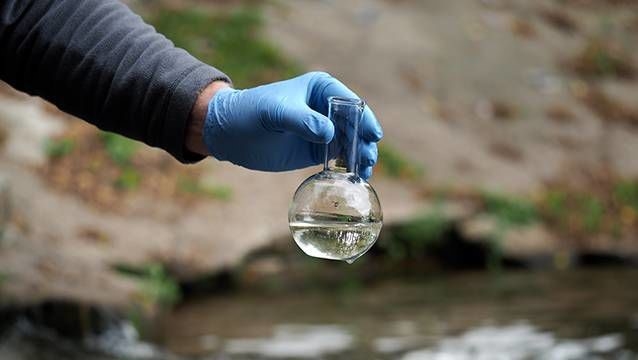
FAYETTEVILLE, Ark. – Michael Meyer, director of the United States Geological Survey's Kansas Water Science Center's Organic Geochemistry Research Laboratory, will be on campus Monday for the Department of Crop, Soil and Environmental Sciences Seminar Series.
Meyer's presentation is "Co-Occurrence of the Glyphosate Additive Polyoxyethylene Tallow Amine (POEA) in Soil and Bed Sediment — A Case for Studying the Environmental Impact of Pesticide Additives."
He speaks at 3:30 p.m. in Plant Science Building Room 009. The seminar is open to everyone on campus, and anyone interested in more about the environmental fate and transport of glyphosate or other contaminants is encouraged to attend.
Meyer's research includes looking at the herbicide glyphosate, commonly known as RoundUp, and its breakdown products in surface and groundwater, and in soil and sediments. His research has enabled scientists to determine where glyphosate and its breakdown products occur in the environment. In addition to discussing glyphosate, he will also address the occurrence of polyoxyethylene tallow amine (POEA), which is commonly added to herbicide products containing the active ingredient glyphosate. Many additives in herbicides and other formulated products are regulated more loosely or in different ways than the active ingredients they contain. A concern is the behavior of those additives in the environment — where they end up and what impacts they may have on an ecosystem.
Meyer began his career at USGS in 1987 as a doctoral student studying the fate of pesticides and their metabolites. His publications include multiple co-authored documents individually cited more than 1,300 times with total citations in excess of 13,000. In 2003, he and his co-authors received the Rudolph Hering Medal from the American Society of Civil Engineers, which is awarded for the most significant paper in environmental engineering. Their work focused on the removal of antibiotics from water through conventional drinking-water processes.
Meyer was ranked among the top one percent of researchers from 2002-2012 in the field of environment/ecology in Thomson Reuters' "The World's Most Influential Scientific Minds 2014" report.
At the Organic Geochemistry Research Laboratory, he helps direct long-term research goals and priorities of the USGS research program Toxics Substances Hydrology Program, Emerging Contaminants and Pesticide Research, and regularly consults with national and international scientists and project managers.
About the Dale Bumpers College of Agricultural, Food and Life Sciences: Bumpers College provides life-changing opportunities to position and prepare graduates who will be leaders in the businesses associated with foods, family, the environment, agriculture, sustainability and human quality of life; and who will be first-choice candidates of employers looking for leaders, innovators, policy makers and entrepreneurs. The college is named for Dale Bumpers, former Arkansas governor and longtime U.S. senator who made the state prominent in national and international agriculture.
About the University of Arkansas: The University of Arkansas provides an internationally competitive education for undergraduate and graduate students in more than 200 academic programs. The university contributes new knowledge, economic development, basic and applied research, and creative activity while also providing service to academic and professional disciplines. The Carnegie Foundation classifies the University of Arkansas among only 2 percent of universities in America that have the highest level of research activity. U.S. News & World Report ranks the University of Arkansas among its top American public research universities. Founded in 1871, the University of Arkansas comprises 10 colleges and schools and maintains a low student-to-faculty ratio that promotes personal attention and close mentoring.
Topics
Contacts
Robby Edwards, director of communications
Dale Bumpers College of Agricultural, Food and Life Sciences
479-575-4625,